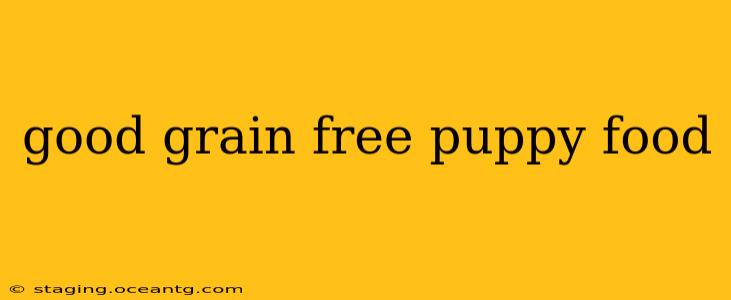Choosing the right food for your puppy is a crucial decision impacting their health, growth, and overall well-being. Many pet owners are turning to grain-free options, believing they offer certain advantages. However, navigating the world of grain-free puppy food can be challenging, with a plethora of brands and formulations available. This guide will help you understand the benefits, potential drawbacks, and key factors to consider when selecting a good grain-free puppy food.
What are the Benefits of Grain-Free Puppy Food?
Many pet owners choose grain-free diets for their puppies due to perceived benefits such as:
- Improved Digestion: Some puppies experience digestive sensitivities to grains like corn, wheat, and soy. Grain-free diets can alleviate symptoms like gas, bloating, and diarrhea in these sensitive pups.
- Potential Allergy Reduction: Grains are common allergens for dogs. A grain-free diet can help manage or eliminate allergic reactions, improving coat health, skin condition, and overall comfort.
- Higher Protein Content: Grain-free formulas often boast a higher protein percentage, essential for building and maintaining lean muscle mass in growing puppies. Protein is crucial for healthy development.
- Increased Fat Content: Fat provides energy and supports healthy brain development. Many grain-free options have increased fat content compared to grain-inclusive counterparts.
What are the Potential Drawbacks of Grain-Free Puppy Food?
While grain-free diets offer potential advantages, it's crucial to acknowledge potential drawbacks:
- Nutritional Imbalance: Poorly formulated grain-free foods may lack essential nutrients vital for a puppy's growth. Always check the AAFCO statement to ensure the food meets nutritional requirements.
- Dilated Cardiomyopathy (DCM): While research is ongoing, a link has been suggested between certain grain-free diets and an increased risk of DCM in dogs. This highlights the importance of choosing high-quality, reputable brands.
- Cost: Grain-free foods tend to be more expensive than grain-inclusive options.
- Limited Ingredient Variety: Some grain-free diets may lack the diverse range of carbohydrates provided by grains, potentially limiting the variety of nutrients.
What to Look for in a Good Grain-Free Puppy Food?
Choosing the right grain-free puppy food requires careful consideration. Here's what to look for:
- AAFCO Statement: Ensure the food meets the Association of American Feed Control Officials (AAFCO) nutritional standards for growth. This statement indicates the food is complete and balanced for puppies.
- Named Meat Source: The first ingredient should be a named meat source (e.g., chicken, beef, lamb), indicating a high protein content.
- High-Quality Protein: Look for easily digestible protein sources, such as chicken, turkey, or fish.
- Healthy Fats: Sources like chicken fat or fish oil provide essential fatty acids for skin and coat health.
- Avoid Fillers: Be wary of foods with excessive fillers, such as potato protein or pea protein concentrates. These often don't provide significant nutritional value.
- Reputable Brand: Choose a brand with a strong reputation and commitment to quality control.
Is Grain-Free Food Right for Every Puppy?
Not every puppy benefits from a grain-free diet. If your puppy is not experiencing digestive issues or allergies, a well-formulated grain-inclusive food might be perfectly suitable. Consult your veterinarian before making any significant dietary changes. They can assess your puppy's individual needs and recommend the best food for their health and development.
What if My Puppy Has Food Allergies?
If your puppy shows signs of food allergies (e.g., itchy skin, digestive upset), a veterinarian can perform allergy testing to identify specific allergens. This testing can guide the selection of a suitable hypoallergenic or elimination diet, which may or may not be grain-free.
How Do I Transition My Puppy to a Grain-Free Diet?
Sudden dietary changes can upset your puppy's digestive system. Gradually transition your puppy to a new grain-free food over 7-10 days. Start by mixing a small amount of the new food with their current food and gradually increase the proportion of the new food over the transition period.
What are some examples of good grain-free puppy food brands?
This section deliberately omits brand names to avoid any bias or implication of endorsement. It's crucial to research different brands independently and select one based on your puppy's specific needs and your own careful review of ingredients and AAFCO statements. Always consult with your veterinarian for personalized recommendations.
Choosing the right grain-free puppy food is a critical step in ensuring your puppy's healthy development. By carefully considering the information presented and consulting your veterinarian, you can make an informed decision that supports your puppy's well-being for years to come. Remember, every puppy is unique, and what works for one may not work for another. Prioritize a balanced, high-quality diet tailored to your puppy's specific needs.
